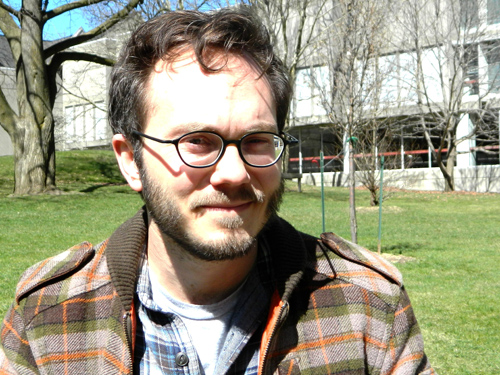
When Andrew Robinson, a PhD student in philosophy, stood up to speak as part of the Philosophy Goes Public series at the Guelph Public Library last month, he noticed that his audience was mostly women.
“That’s an extra challenge,” he says. “Not only was I preaching to the converted, but there seems to be something backwards about a man telling women about what it means to be a woman.” He went ahead with his presentation on “Feminism and Men Today” all the same, and in the end found the response was very positive.
“I don’t want to stand up and say, ‘Here is how men should relate to feminists,’ as though I know what women’s problems are,” he says. “Yet I think it is important for men to hear this message from another man.”
The basic question discussed in his talk is also the focus of his doctoral dissertation: what can men do today to help achieve feminist goals?
“In the talk, I described masculine privilege largely in terms of access,” he says. “Men have more access to education, to gainful and meaningful employment, to women’s emotions and to women’s bodies. I draw on examples from various feminist writings to show how this works.”
Robinson explains that the privilege and access men are usually accorded can often turn into a sense of entitlement. “We have a system and structure in place that supports men’s privilege,” he adds.
When involved with a man, women generally care more about how the relationship is going, Robinson says. Men see it as “unmanly” to care or worry about their relationships. “That leads to an imbalance in who does the caring and the work of maintaining that relationship.”
It’s easy to look at the world today and see that feminism has made many gains. More women are able to access post-secondary education, for example, and there is greater participation of women in the work force. That doesn’t mean the problems are solved, or that we’ve “achieved feminism. The higher-end positions in institutions and businesses are still mostly taken by men,” Robinson points out. “There is still a lot of work to be done.”
He adds that despite increased training about sexual harassment in some organizations, one of the women in the audience at his talk commented that it still exists even if it is less blatant these days. Robinson says he knows students who work as servers in restaurants and find sexual harassment is rampant in many restaurants: “They either put up with it, or quit and try to find another job.”
And while there may be more women working, men have what Robinson describes as “more cultural legitimacy. They have a legitimate place in the public sphere, the right to express themselves. Yes, there are women writers and women politicians, but we need to ask who counts as a legitimate voice? Who is paid attention to?”
Robinson finds that discussing male privilege often causes men to react defensively. He understands why. “The reality is that even when I am trying not to be sexist, privilege is still conferred on me, as a man, from the outside. What that means for men is that it is incredibly hard to root out those behaviours.”
It’s something Robinson takes seriously in his own life. He’d always had an interest in social justice issues, but realized that for him – as a white male attending university – “there’s nothing that is a problem for me. I am in this position of privilege, with no claims on the problems of racism or sexism, for example.”
Instead, he turned the issue on its head, asking: “Since this is who I am, in what ways does my privilege obligate me towards others? What are the ethical implications of my privilege?”
Robinson currently teaches three of the five remaining women’s studies courses. “I’ve had students tell me that when they started in my class, they didn’t think a man could teach women’s studies, but they found that it worked.” He admits this has been a boon to his confidence. Yet this is punctuated by more humbling moments when he is reminded of his own privilege and related biases. “My students continually challenge me and teach me about myself.”
While some might point to the gains women have made and think feminism’s day is over, Robinson thinks it’s dangerous to become complacent. “We have this sense of moral progress, that the present is better than the past and the future will be even better,” he says. “But if you look at history, you’ll see there are always periods of gain and regression. We need to know that things can improve, but we also have to guard against losing the gains that have been made.”